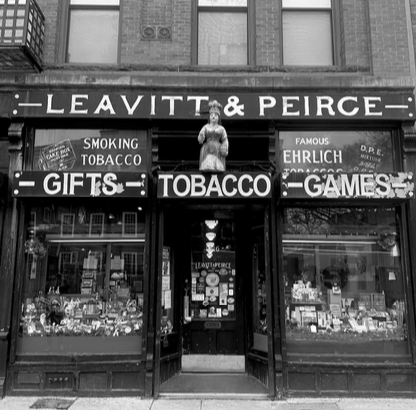“Essentially, it was a social club,” said Sean McGann, decade-long employee and current manager of Leavitt & Peirce. For much of its history, the tobacco shop was not just integrated, but a central part of Harvard campus; students living in the Hilton Block passed through the shop—occupying the dorm’s first floor—each day. Billiards tables lined the back of the store, and tickets for Harvard events were available for purchase, with students lining the street each year before The Game. “You know, they’re smoking and drinking and laughing,” McGann continued.
Frowned upon by the College for such disorderly rowdiness, Leavitt & Peirce maintained an aura of exclusivity to shield from administrative crackdown. Whether imposed by the owners or the students (the history remains obfuscated), the non-clubman’s club had an implicit no-freshman rule for the shop’s tables. Even though nineteenth-century Harvard students could not start their journey at the shop, they all ended with a taste—each graduate adorned with a cigar from the shop during commencement.
Times have changed since Leavitt & Peirce first opened. “There used to be smaller businesses, musicians, poets, artists,” McGann said, “It sort of seems more clinical now.” Despite the evident commercialization of other Harvard Square shops, L&P remains.
As a time capsule of sorts, Leavitt & Peirce is dedicated to preserving Harvard’s past. The register is manned exclusively by hand and the wall decor dates older than many campus monuments. Whatever the appeal, the shop draws a wide crowd. McGann noted that the clientele represented “No real class at all… You can get, you know, people like tweaked out on meth upwards of politicians, you know, billionaires. That’s what I love about the job.”
The regulars are consistent, a product of both tobacco’s inherent addictiveness as well as a familiar customer culture found at no other convenience store. Drawn in by the alternative nature of pipe-smoking and hand-rolling, Leavitt & Peirce provides a welcoming space unlike any other place in Harvard Square.
Leavitt & Peirce’s signature is in its smell. Barrels of loose tobacco create an unmistakable aroma, one employees have long gotten used to, that lingers in every corner. Employees fill their tables with hard cedar soaps, their shelves with Harvard vs. Yale footballs, and their bins with vintage poster finds. A faint clicking—L&P’s tried and true Casio calculator—rings up another customer’s total.
Fred Leavitt and Waldo Peirce founded the shop together in 1883, each man taking on a distinct role. While Leavitt leveraged his charismatic mustache as the shop’s showman, Peirce’s stern personality was better suited for tending the books. Even today, the shop’s personalized and traditional retail experience tops charts at Forbes.
140 years later, the timeless tobacco shop has endured difficulties that Fred and Waldo could never have foreseen.
“Say, when’s the last time you’ve seen someone walk down the street with a pipe?” McGann asked. While seeing a pipe-smoker on Massachusetts Ave might be disconcerting now, they were once L&P’s mainstay.
Yet recent fluctuations in demand for nicotine products have forced the shop to evolve. Former Governor of Massachusetts Charlie Baker’s 2019 crusade against carts and flavored nicotine products has only made life more difficult for the shop. Rows of glass jars sit eerily empty on shelves after the shop had to purge its inventory of flavored mixed tobaccos—not exactly the target of Baker’s efforts, but an incidental harm of lazy policy making nonetheless.
As with most small businesses, COVID-19 shutdowns took a toll, forcing the shop to shut down and minimize expenses. McGann recounted, “We used to have a lot more employees. We’ve just had to really cut costs where we could make it work.”
Weak will and feeble decision-making does not sustain a business for 139 years; and just a couple years after COVID’s initial lockdown, Leavitt & Peirce is thriving again. Online sales have risen, and the shop is hiring people again, so go apply! (But, only if your long addition is second-nature, you have a passion for pocket knife manufacturers, and are ready to stick around for a while).
In recounting his time at L&P, McGann shared a story that demonstrated the nonchalant nature of the store’s clientele. “I was filling his Zippo lighter and I juiced it, I put too much fuel in it,” he said, “[The customer] decided to light it while it was out of the jacket. So he’s holding a ball of flames.” McGann then instructed the customer to drop the fiery mass, kicking it out the door himself. “It did collide with a person walking by. Did not faze them at all. He just kept going.”
Despite this alarmingly dangerous anecdote, Leavitt and Peirce’s charm lies in its its quiet discordance. It’s hard to reconcile the fringe nature of a tobacco shop next to the steps of a hyper-traditional university. While the salient aroma of cigars should not feel so comforting to non-smokers, strangely enough, it does. No where else would guava mints share the same countertop space as a pipe display. Yet somehow, it works, and the shop encourages customers to buy into the kitschiness of it all.
Katy Lin ’26 (katylin@college.harvard.edu) purchased a Zippo lighter from L&P the week prior.
Kendall Carll ’26 (kcarll@college.harvard.edu) regularly sends his mom L&P postcards.

